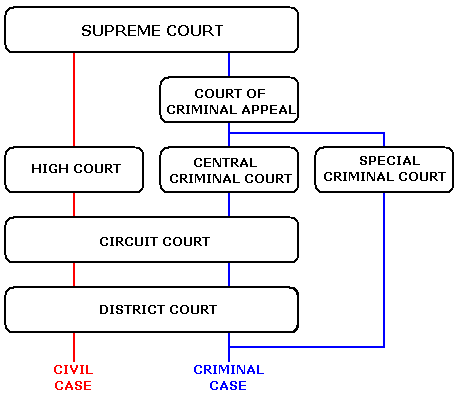3-02-17
Laura Connolly
Judges have the jurisdiction to adjudicate on civil and criminal cases in Ireland. The differences between these cases are as follows;
Civil Law in Ireland
Civil law is usually dealing with private disputes between one or more people or legal entities and the result is usually a monetary reward. If a person wishes to bring a case against an individual or a corporation because they believe they were wronged they can bring it to the civil courts.
An example of a civil action would be defamation cases or a breach of contract case.
Criminal Law in Ireland
Criminal Law is when an individual has committed a crime harming another person or committed an act that harmed society as a whole. Due to this the state takes action and the case is usually resolved by way of fine or a term of imprisonment. A major difference between civil and criminal cases would be that the prosecutor in a criminal case is not the victim of the crime but in fact the state itself.
At times when a case is of both a civil and criminal nature, then the criminal prosecution is usually completed before the civil case is heard.

The Criminal Function of The Courts
District Court
The district court is the first court that criminal cases are brought to for preliminary hearings and they will then be sent to a higher court for sentencing.
For a light criminal offense the accused can agree to be tried summarily (without a jury) in the district court.
The Circuit Court
The Circuit Court has the jurisdiction to hear criminal cases apart from cases involving murder, rape, aggravated sexual assault, treason, genocide and piracy.They are tried instead by the Central Criminal Court (a subsection of The High Court).
The Circuit Court also hears appeals from the District Courts.
The High Court, The Central Criminal Court, and The Special Criminal Court
The High Court hears appeals from the Circuit Courts. When dealing with the criminal cases mentioned above the High Court is known as The Central Criminal Court. There is another court called The Special Criminal Court. The cases heard here are without a jury because of the threat of the jury being manipulated or threatened by individuals outside the court with connections to the accused. There is also no media coverage of specific details of the cases.
Appeals from the Central Criminal Court and The Special Criminal Court go to The Court of Criminal Appeal.
The Supreme Court
The Supreme Court hears appeals from the High Court.
The Appellate System
The Appellate System of The Irish Court System is simply how civil and criminal law cases can be appealed to the next higher court if the accused or prosecutor is unhappy with the outcome of the case.